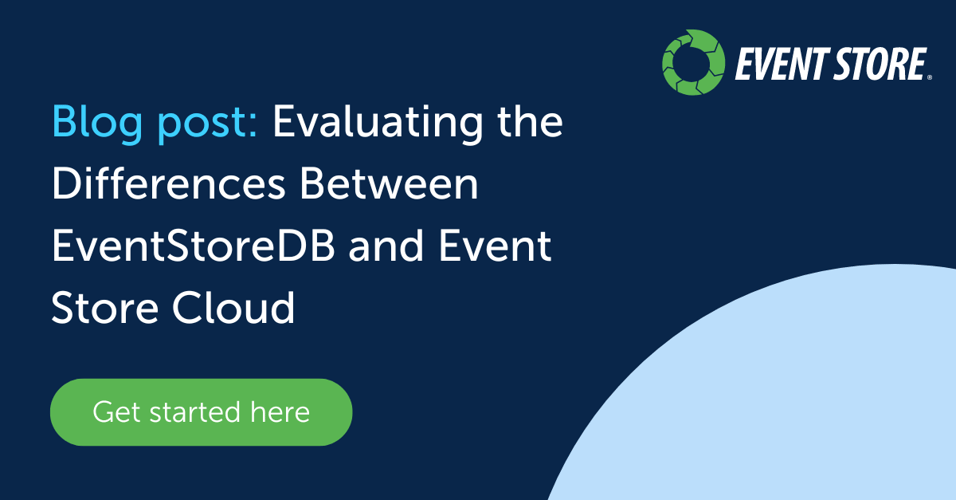
Evaluating the Differences Between EventStoreDB and Event Store Cloud
Whether you work for a start-up or a large corporate company, you need a reliable operational database to store and organize essential data, whilst improving your customer experience.
IT teams sometimes overlook the importance of operational databases by focusing on customer-facing applications—but real-time data analysis is a must.
If you’re a Software Architect or Developer, here’s Event Store’s two distinct offerings that will make your life easier.
-
Our open-source EventStoreDB—a new category of database with a state-transition data model—allows software developers to use an open-source version whilst building a proof of concept, whether on-premise or in a cloud environment.
- Event Store Cloud is a complete managed offering for those that have built EventStoreDB projects. The Event Store team will manage the database infrastructure for development and production, enabling your team to focus on other business needs.
Cloud operational databases can be deployed on a cloud-based virtual machine (VM) and self-managed by an in-house IT team (EventStoreDB) or offered as a managed database-as-a-service (DBaaS). So, what are the fundamental differences? Let’s dive in.
EventStoreDB
Say goodbye to your cluttered data lakes and complex ‘extract, transform, load’ (ETL) pipelines.
EventStoreDB takes the analysis of current state data by traditional databases a step further. Developers can now capture data at its most fundamental level and address the impact of changes to historical data, meaning real-time data flow, asynchronous scalability, and time travel.
EventStoreDB is suited for developers with complex use cases that will benefit from an event-driven approach - whether for new projects, or migrating from a legacy system to a more microservices approach. The good news is, every traditional database is compatible with Event Store. Developers can migrate legacy systems without long-term planning and downtime.
It’s important to note EventStoreDB consists of a new data model, data transformation for projections, and on-demand data—with streaming access provided. By following event-driven architecture, we store the why and how of business contexts as a sequence of events that can be paused, replayed, and streamed whenever you want.
A key benefit to storing data as events is that the context for each business decision is recorded, allowing you to create highly scalable, flexible, and performant systems.
EventStoreDB works on operating systems such as Windows, Ubuntu, CentOS, Amazon Linux, and Oracle Linux, and it can be run for development purposes on Docker or Kubernetes. For those wanting to maximize database storage in a cloud environment, EventStoreDB clusters support AWS, Azure, and GCP clouds.
Database admins can install this open-source database offering in many ways: through software such as package managers, direct from our website, or our GitHub repository. For more information on getting set up, visit our tech docs.
Event Store Cloud
You may have already started deconstructing your monolithic architecture by moving from a traditional database to EventStoreDB. Using it in a cloud environment instead of self-managed can distribute organizational workloads, speed up performance, and increase the reliability of applications.
But if you want to boost productivity and have a more scalable cloud database, you may need extra paid support. That’s where we can become more hands-on with our multi-cloud SaaS offering, Event Store Cloud. It includes the added benefits of scheduled backups and improved access control policy configuration, among many other features.
It supports AWS, GCP, and Azure, so you can subscribe to and manage EventStoreDB service offerings via Terraform & Pulumi.
It’s also fully compatible with the existing EventStoreDB database product, enabling you to adopt the solution and migrate easily.
If you have already signed up to our community forum, you can log in to the Event Store Cloud using your existing account. If you are new to our site, visit the Event Store Cloud console and create an account.
If you’d like to discuss your project or migration or require help getting set up, get in touch.